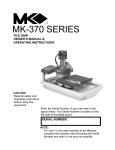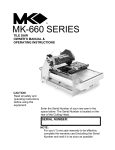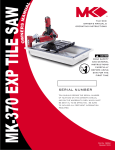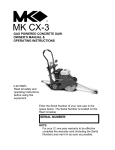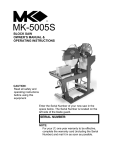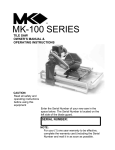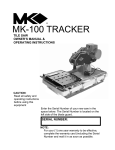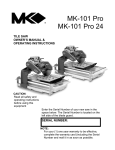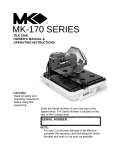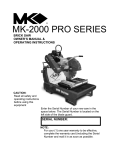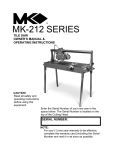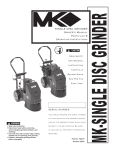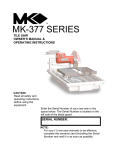Download MK Diamond Products MK- 2005G Owner`s manual
Transcript
MK- 2005G GAS POWERED BRICK SAW OWNER’S MANUAL & OPERATING INSTRUCTIONS CAUTION: Read all safety and operating instructions before using this equipment Enter the Serial Number of your new saw in the space below. The Serial Number is located on the left side of the blade guard. SERIAL NUMBER: NOTE: For your (1) one year warranty to be effective, complete the warranty card (including the Serial Number and mail it in as soon as possible. Table of Contents INTRODUCTION We at MK Diamond want to congratulate you on selecting the MK-2005G Brick Saw. We are certain that you will be pleased with your purchase. MK Diamond takes pride in producing the finest products in the industry. Operated correctly, your MK-2005G should provide you with years of quality service. In order to help you, we have included this manual. This owners manual contains information necessary to operate and maintain your MK-2005G safely and correctly. Please take a few minutes to familiarize yourself with the MK-2005G by reading and reviewing this manual. If you should have questions concerning your MK-2005G, please feel free to call our friendly customer service department at: 800 421-5830 Regards, MK Diamond MK-2005G Revision 1, Effective Date December 26, 2000 Table of Contents Page 2 TABLE OF CONTENTS Page SAFETY: Safety Messages Damage Prevention Message General Safety Precautions and Hazard Symbols California Proposition 65 Message Safety Label Locations Brick Saw Specific Warnings Product Specifications 4 4 4 6 7 7 8 UNPACKING, TRANSPORT, UNIVERSAL STAND and ASSEMBLY Unpacking Contents Transport Universal Stand Assembly 9 9 9 10 11 SETUP, STARTUP, ADJUSTMENT, OPERATION and SHUTDOWN Setup Startup Adjustment and Operation Shutdown Cleanup 15 18 19 25 25 MAINTENANCE AND TROUBLESHOOTING Maintenance Troubleshooting 27 44 EXPLODED VIEW AND PARTS LIST Exploded View Parts List 47 48 THEORY Theory Of Diamond Blades 52 ACCESSORIES ORDERING and RETURN INSTRUCTIONS Accessories Ordering Information Return Material Policy Packaging Instructions Authorized Service Centers 53 54 55 55 55 Manual Part No. 158320 MK-2005G Revision No. 1 Revision 1, Effective Date December 26, 2000 Page 3 SAFETY Read and follow all safety, operating and maintenance instructions. Failure to read and follow these instructions could result in injury or death to you or others. Failure to read and follow these instructions could also result in damage and/or reduced equipment life. SAFETY MESSAGES: Safety messages inform the user about potential hazards that could lead to injury, death and/or equipment damage. Each safety message will be preceded by one of the following (3) three words that identify the severity of the message. Not following instructions WILL lead to DEATH or SERIOUS INJURY Not following instructions COULD lead to DEATH or SERIOUS INJURY Not following instructions CAN lead to injury DAMAGE PREVENTION AND INFORMATION MESSAGES: A Damage Prevention Message is to inform the user of important information and/or instructions that could lead to equipment or other property damage if not followed. Information messages convey information that pertains to the equipment being used. Each message will be preceded by the word note, as in the example below. NOTE: Equipment and/or property damage may result if these instructions are not followed. GENERAL SAFETY PRECAUTIONS AND HAZARD SYMBOLS: In order to prevent injury, the following safety precautions and symbols should be followed at all times! Safety Precautions: KEEP GUARDS IN PLACE. In order to prevent injury, keep guards in place and in working order at all times. EXPLOSIVE FUEL! Gasoline is extremely flammable, its vapors can explode if ignited; store only in approved containers, in well-ventilated, unoccupied buildings and away from sparks or flames. Do not fill the fuel tank while the engine is running or hot. Spilled fuel could ignite if it contacts hot parts or sparks from ignition. Do not start the engine near spilled fuel. Never use gasoline as a cleaning agent. LETHAL EXHAUST GASES! Engine exhaust gasses contain poisonous carbon monoxide, an odorless colorless gas that can cause death if inhaled. Avoid inhaling exhaust fumes, and never run the engine in a closed building or confined area. ELECTRICAL SHOCK! Never touch electrical wires or components while the motor is running. Exposed, frayed or worn electrical motor wiring can be sources of electrical shock that could cause severe injury or burns. ENGINE OVER-SPEED. Never tamper with the governor components or settings to increase the maximum speed of the machine. Severe personal injury and/or equipment damage could result if the equipment is operated speeds above design maximum. MK-2005G Revision 1, Effective Date December 26, 2000 Table of Contents Page 4 SAFETY ACCIDENTAL STARTS! Before starting the engine, be sure the ON/OFF switch is in the "OFF" position to prevent accidental starting. Place the ON/OFF switch in the OFF position before performing any service operation. ROTATING OR MOVING PARTS! Keep hands, feet, hair, and clothing away from all moving parts to prevent injury. Never operate a power tool with shrouds or guards removed. HOT PARTS! Engine components can become extremely hot from operation. To prevent severe burns, do not touch these areas while the engine is running, or immediately after it is turned off. Never operate the engine with heat shields removed. ALWAYS USE SAFETY GLASSES! Safety glasses should always be worn when working around power tools. Everyday eyeglasses only have impact resistant lenses and may not prevent eye injury; they are NOT safety glasses. ALWAYS USE RESPIRATORY PROTECTON! Exhaust gases may be harmful if inhaled. Do not operate gas-powered equipment in enclosed spaces. Respiratory protection should be worn when operating gas powered equipment. ALWAYS USE HEARING PROTECTION! To reduce the possibility of hearing loss, always use hearing protection when operating equipment. REMOVE ADJUSTING KEYS AND WRENCHES. Form a habit of checking to see that keys and adjusting wrenches are removed from the power tool before it is turned on. KEEP WORK AREA CLEAN. Cluttered work areas and benches invite accidents. DO NOT USE IN DANGEROUS ENVIRONMENTS. Do not operate equipment in dangerous environments. Always keep the work area well lighted. KEEP CHILDREN AWAY. All visitors and children should be kept a safe distance from work area. MAKE WORKSHOP KID PROOF. Make the workshops kid proof by using padlocks, master switches or by removing starter keys. DO NOT FORCE THE TOOL. A power tool will do a job better and safer operating at the rate for which it was designed. USE THE RIGHT TOOL. Do not force a tool or an attachment, to do a job that it was not designed to do. WEAR PROPER APPAREL. Do not wear loose clothing, gloves, neckties, rings, bracelets, or other jewelry that may be caught in moving parts. Nonslip footwear is recommended. Wear protective hair covering to contain long hair. SECURE WORK. Clamps or a vise should be used to hold work whenever practical. Keeping your hands free to operate a power tool is safer. MK-2005G Revision 1, Effective Date December 26, 2000 Table of Contents Page 5 SAFETY DO NOT OVERREACH. Keep proper footing and balance at all times by not overreaching. MAINTAIN TOOLS WITH CARE. Keep tools sharp and clean for the best and safest performance. Always follow maintenance instructions for lubricating and when changing accessories. SHUTDOWN TOOL. The saw should always be shutdown before servicing or when changing accessories such as blades, bits, cutters, and the like. USE RECOMMENDED ACCESSORIES. Consult the owner's manual for recommended accessories. Using improper accessories may increase the risk of personal or by-stander injury. NEVER STAND ON THE TOOL. Serious injury could occur if a power tool is tipped, or if a cutting tool is unintentionally contacted. NEVER LEAVE TOOL RUNNING UNATTENDED – TURN POWER OFF. Do not leave a tool until it comes to a complete stop. Always turn a power tool OFF when leaving the work area, or, when a cut is finished. CHECK FOR DAMAGED PARTS. Before using a power tool, check for damaged parts. A guard or any other part that is damaged should be carefully checked to determine it would operate properly and perform its intended function. Always check moving parts for proper alignment or binding. Check for broken parts, mountings and all other conditions that may affect the operation of the power tool. A guard or any damaged part should be properly repaired or replaced. DIRECTION OF FEED. Always feed work into a blade or cutter against the direction of rotation. A blade or cutter should always be installed such that rotation is in the direction of the arrow imprinted on the side of the blade or cutter. Sawing and drilling generates dust. Excessive airborne particles may cause irritation to eyes, skin and respiratory tract. To avoid breathing impairment, always employ dust controls and protection suitable to the material being sawed or drilled; See OSHA (29 CFR Part 1910.1200). Diamond Blades improperly used are dangerous. Comply with American National Standards Institute Safety Code, B7.1 and, Occupational Safety and Health Act covering Speed, Safety Guards, Flanges, Mounting Procedures, General Operating Rules, Handling, Storage and General Machine Conditions. CALIFORNIA PROPOSITION 65 MESSAGE: Some dust created by power sanding, sawing, grinding, drilling, and other construction activities contain chemicals known [to the State of California] to cause cancer, birth defects or other reproductive harm. Some examples of these chemicals are: • Lead, from lead-based paints • Crystalline silica, from bricks and cement and other masonry products • Arsenic and chromium, from chemically treated lumber Your risk from these exposures varies depending on how often you do this type of work. To reduce your exposure to these chemicals, work in a well-ventilated area, and work with approved safety equipment, such as those dust masks that are specially designed to filter out microscopic particles. For further information, consult the following sources: http://www.osha-slc.gov/sltc/silicarystalline/index.html http://www.oehha.org/prop65/out_of_date/6022kLstA.html MK-2005G Revision 1, Effective Date December 26, 2000 Table of Contents Page 6 SAFETY SAFETY LABEL LOCATIONS: Safety labels are located according to Figures 1 through 6 below. The labels contain important safety information. Please read the information contained on each safety label. These labels are considered a permanent part of your saw. If a label comes off or becomes hard to read, contact MK Diamond or your dealer for a replacement. Item 1A 1B 2A 2B 2C 3 4 5 6A 6B Location Motor-tank, front Motor-tank, front Motor-tank, top Motor-tank, top Motor-tank, top Motor-tank, right Motor-tank, left Motor-air filter Blade Guard Blade Guard Description Oil Alert Danger-Use in Ventilated Areas Warning-Do Not Overfill Caution-Hot Surface Honda Motor Information Danger-California Exhaust Warning Read Honda Owner's Manual Caution-Clean Air Filter Serial Number Caution-Operating Safety Instructions A Part No. N/A 155582 155580 155578 N/A 155581 N/A N/A 157007 155040 A B B C 1 2 3 4 B A 5 6 Brick Saw SPECIFIC WARNINGS: • • • Read Owner's Manual Keep All Guards In Place Always Wear Approved Safety Protection For: MK-2005G Ø Ø Ø Ear Eye Head Revision 1, Effective Date December 26, 2000 Table of Contents Page 7 SAFETY PRODUCT SPECIFICATIONS: The MK-2005G is a versatile gas powered brick saw. Operated and used according to this manual, the MK2005G will provide years of dependable service. General Description: The MK-2005G Brick Saw is engineered as a portable brick saw powered by a 5.5 horsepower, pull start, Honda gas engine. The saw is capable of cutting masonry up to five (5) inches (127 mm) in height in a single pass. Motor Specifications: Honda motor specifications for the MK-2005G are listed in Table 1 below. Motor Type Max Power Output Max RPM Fuel Tank Capacity Engine Oil Capacity 4-stroke, overhead valve, single cylinder 5.5 Hp 3,600 RPM 0.95 gallons (3.6 liters) 0.63 quarts (0.6 liters) Table 1 Blade Capacity: The MK-2005G is designed for use with a 14-inch diameter segmented wet or dry MK Diamond blade with a .110 to .375 inch cutting width. Masonry Types: The MK-2005G can cut a variety of masonry types including, cinder block, slump stone block, wall brick, paver brick, concrete block and cylinders, roofing tile, marble, granite, decorative rock or almost any other non-ferrous material. NOTE: The MK-2005G is not designed to cut plastic or ferrous (metals) material. Spring Assisted Cutting Head: The MK-2005G is designed with a spring-assisted cutting head to allow for easier step cutting. The Cutting Head can be locked in the down position when cutting smaller pieces. Shaft Operated Water Pump: The MK-2005G has a flexible shaft, belt driven water pump supplying cooling water to the blade for wet cutting operations. Design Size: The MK-2005G is designed to accommodate a piece up to eighteen and one-half (18-1/2) inches (470 mm) wide, thirty (30) inches (760mm) long and seven and one-half (7-1/2) inches high. MK-2005G Revision 1, Effective Date December 26, 2000 Table of Contents Page 8 UNPACKING, TRANSPORT, UNIVERSAL STAND and ASSEMBLY UNPACKING: Your MK-2005G has been shipped from the factory thoroughly inspected. Only minimal assembly is required. If not done, completely remove the plastic wrapping from the MK-2005G. Remove the accessories box from the Water Basin and remove the contents from the box. CONTENTS: In your container, you will find one (1) MK-2005G, one (1) movable cutting table, one (1) adjustable cutting guide, one (1) drain plug, one (1) blade wrench, one (1) owner's manual, one (1) Honda owner's manual and one (1) warranty card. MK-2005G Movable Cutting Table Adjustable Cutting Guide Owner's Manual Honda Owner's Manual Warranty Card Drain Plug Blade Wrench TRANSPORT: The MK-2005G weighs approximately 200 pounds; two people should be used when transporting the saw. 1. 2. Never transport the MK-2005G with water in the Cooling Basin. The MK-2005G, Brick Saw weighs approximately 200 pounds; two people are required when lifting or moving. NOTE: Lock the Cutting Head in the DOWN position, and remove the Movable Cutting Table when transporting the MK-2005G. The MK-2005G is designed with recessed handles in the right and left upright castings for ease of transport. To transport – • Verify the Movable Cutting Head is locked in the down position and the Movable Cutting Table is removed • Grasp the saw by the recessed handle in the right and left upright castings • Grasp the front of the saw • Lift and transport the saw to the desired work location Cutting Head Locked Down Remove Movable Cutting Table Lift Point MK-2005G Lift Point Revision 1, Effective Date December 26, 2000 Table of Contents Page 9 UNPACKING, TRANSPORT, UNIVERSAL STAND and ASSEMBLY UNIVERSAL STAND: Note: If using the MK Diamond, Universal Stand, perform the following steps. 1. Preparing to Seat Saw: The MK-2000, Brick Saw weighs approximately 200 pounds; two people are required when lifting or moving. Loosen Wing Nut Slide Water Basin out back of Saw Pivot Up (A) Open the Universal Stand and place on flat surface (B) Position Water Pump clear of Water Basin (C) Remove Water Basin 2. Seating the Saw: Front Brace Back of Saw Back of Stand (A) Orient the Saw to the Stand Rear of Saw Front of Stand (B) Seat front of Saw on the front of the Stand Back of Stand (C) Seat rear of Saw on the back of the Stand 3. Final: Slide Water Basin in back of Saw (C) Reinstall Water Basin MK-2005G Revision 1, Effective Date December 26, 2000 Table of Contents Page 10 UNPACKING, TRANSPORT, UNIVERSAL STAND and ASSEMBLY ASSEMBLY: Follow the assembly instructions in this section to prepare your MK-2005G for operation. 1. Movable Cutting Table Installation: Cutting Table Front Roller Wheels Guide Rail (A) Position Movable Cutting Table Roller Wheels above Saw Guide Rails Roller Wheels Guide Rails (B) Seat Movable Cutting Table Roller Wheels on Saw Guide Rails Move back and forth to verify ease of movement (C) Verify Movable Cutting Table is seated correctly 2. Adjustable Cutting Guide Installation: NOTE: The Adjustable Cutting Guide can be used on either side of the Diamond Blade. Turn counterclockwise to loosen Align Parallel Slots Turn clockwise to tighten Ruler/Stop (A) Loosen Adjustable Cutting Guide retaining thumbscrew (B) Position Adjustable Cutting Guide above Movable Cutting Table Seated (C) Seat and tighten the Adjustable Cutting Guide retaining thumbscrew 3. Releasing Cutting Head: The following actions will cause the Cutting Head to rotate upward, hold the saw by the handle and control the upward movement. NOTE: The Cutting Head is locked in the down position when shipped from the factory. Turn counterclockwise to loosen Locking Handle 9/16-inch wrench (A) Remove Cutting Head Locking Handle from shipping location discard the Shipping Nut MK-2005G 9/16-inch wrench Shipping Bolt (B) Remove Shipping Bolt from the Cutting Head – discard Shipping Bolt Revision 1, Effective Date December 26, 2000 Table of Contents Turn clockwise to tighten Height Adjustment Stud Locking Handle (C) Install Cutting Head Locking Handle into Height Adjustment Stud Page 11 UNPACKING, TRANSPORT, UNIVERSAL STAND and ASSEMBLY 4. Diamond Blade Installation: NOTE: When installing the diamond blade retaining-bolt, ensure the threads of the bolt are aligned with the threads of the drive shaft so as not to “cross-thread" the bolt. Cutting Head Blade Wrench Loosen Locking Handle to adjust Cutting Head Retaining Screw and Outer Flange Install Blade Turn counterclockwise to loosen (A) Raise Cutting Head (B) Identify and remove Retaining Screw and Outer Flange (C) Install Diamond Blade onto Blade Shaft Rotate Blade Wrench clockwise to tighten Seat Blade on Blade Shaft Retaining Screw and Outer Flange Rotation Direction (D) Verify Blade is seated on Blade Shaft in correct rotation direction (E) Install Retaining Screw and Outer Flange then tighten 5. Water Pump Installation: NOTE: The Belt Driven, Flexible Shaft Water Pump is locked in the shipping position from the factory. It will need to be removed from between the left Upright Casting and the Cutting Head to allow free movement of the Cutting Head. Loosen Wing Nut 7/16-inch Wrench Remove Water Pump (A) Loosen and remove Water Pump adjustment clamp, wing nut and bolt MK-2005G Remove Water Pump from Clamp Cutting Head Loosen Wing Nut Water Pump (B) Loosen and remove Water Pump retaining clamp, wing nut and bolt Revision 1, Effective Date December 26, 2000 Table of Contents Upright Casting (C) Remove Water Pump Assembly from between left Upright Casting and Cutting Head Page 12 UNPACKING, TRANSPORT, UNIVERSAL STAND and ASSEMBLY 7/16-inch Wrench Install Water Pump into Clamp Tighten Wing Nut Install Water Pump Tighten Wing Nut (D) Install Water Pump retaining clamp, wing nut and bolt (E) Install Water Pump adjustment clamp. wing nut and bolt 6. Filling Oil Reservoir: NOTE: SAE 10W-30 is recommended for general use in temperatures of – 4ºF (20ºC) and above. If you are operating outside of this range, consult the chart in this manual. Engine Oil Capacity is 0.63 US qt (0.6l). Cutting Head Turn counterclockwise to loosen Loosen Locking Handle to adjust Cutting Head (A) Level Cutting Head Dipstick (B) Remove Dipstick Fill through Reservoir fill hole (C) Fill Oil Reservoir NOTE: When installing the Oil Dipstick, ensure the threads are aligned with the threads of the Oil Reservoir so as not to “cross-thread" the dipstick. Bottom Edge Turn clockwise to tighten Wipe up excess oil Dipstick (D) Add Oil until level reaches the bottom edge of fill hole MK-2005G (E) Install Dipstick Revision 1, Effective Date December 26, 2000 Table of Contents (F) Clean Up Page 13 UNPACKING, TRANSPORT, UNIVERSAL STAND and ASSEMBLY 7. Filling Fuel Tank: 1. Gasoline is highly flammable and explosive. You can be burned or seriously injured when handling fuel. 2. To fuel, stop engine if running, and allow it to cool. 3. Refuel in a well-ventilated area. 4. Keep gasoline away from appliance pilot lights, barbecues, electric appliances, power tools, etc. 5. Wipe up spills immediately. NOTES: 1. Fuel can damage paint and plastic. Be careful not to spill fuel when filling the fuel tank. Damage caused by spilled fuel IS NOT covered under the warranty. 2. DO NOT use stale or contaminated gasoline, or an oil/gasoline mixture. 3. If using the Universal Stand with the MK-2005G, a ladder meeting OSHA specification is recommended. 4. Use unleaded gasoline with a pump octane rating of 86 or higher. Turn counterclockwise to loosen Fill Throat Fuel Cap (A) Remove Fuel Cap Fill Throat Upper Limit (B) Fill Fuel Tank (C) Verify fuel level is below the throat of the Fuel Tank Turn clockwise to tighten Fuel Cap (D) Install Fuel Cap MK-2005G Revision 1, Effective Date December 26, 2000 Table of Contents Page 14 SETUP, STARTUP, ADJUSTMENT, OPERATION and SHUTDOWN SETUP: 1. Pre-start Inspection: The pre-start inspection should be performed before beginning any job. If the Diamond Blade shows signs of fatigue cracking, replace the blade before starting work. Cracks Verify Ease of Movement (See Maintenance Section) Replace if Excessively Grooved (See Maintenance Section) (A) Inspect Blade for damage – Verify Blade correct for material being cut (B) Inspect Wooden Strip for excessive grooves Inspect for damage Look for leaks (D) Inspect Engine for leaks Fill Throat (C) Verify Movable Cutting Table moves freely Proper Oil Level Low Level (E) Inspect MK-2005G for general damage, loose connections and hardware (F) Check for proper oil level (See Maintenance section if low) Air Filter Upper Limit (G) Check for proper fuel level (See Maintenance section if low) MK-2005G (H) Check Air Filter for cleanliness (See Maintenance section if dirty) Revision 1, Effective Date December 26, 2000 Table of Contents Page 15 SETUP, STARTUP, ADJUSTMENT, OPERATION and SHUTDOWN 2. Water Pump Setup: The Water Pump can be setup in three ways, External Water Source, Re-circulation or Un-coupled for dry blade operation. NOTE: To extend the life of the Diamond Blade and Water Pump, MK Diamond recommends a clean cooling water source when using a Wet Diamond Blade. I. External Water Source: This is the preferred method of cooling when using a "wet" diamond blade. Drain Plug Water Basin Loosen Wing Nut Remove Water Pump (A) Verify Water Basin is inserted into the MK-2005G and remove the Drain Plug (B) Loosen and remove Water Pump adjustment clamp, wing nut and bolt Water Pump Water Container (C) Place the Water Pump Assembly into an External Water Source Container Clean Water (D) Fill the External Water Source Container and place a Catch Basin below the Drain Hole II. Re-circulation: NOTE: 1. Water Pump could interfere with masonry being cut. 2. Water should be periodically replaced when using this method. Drain Plug Water Basin Loosen Wing Nut Water Pump Molded Stand (A) Verify Water Basin is inserted into the MK-2005G and install the Drain Plug MK-2005G (B) Loosen Water Pump adjustment clamp wing nut and bolt Revision 1, Effective Date December 26, 2000 Table of Contents (C) Place Water Pump on Pump Stand molded into Water Basin Page 16 SETUP, STARTUP, ADJUSTMENT, OPERATION and SHUTDOWN Clean Water (D) Fill the Water Basin with clean water III. Dry Blade Operation: NOTE: Failure to perform the following steps will lead to premature pump failure. Pivot Plate 9/16-inch Wrench Retaining Bolts (A) Identify Water Pump Drive End Pivot Plate Splash Curtain Curtain Rod (B) Loosen Water Pump Drive End Pivot Plate front and rear retaining bolts 9/16-inch Wrench (C) Pivot front of Water Pump Drive End Pivot Plate up and tighten the retaining bolts Loosen Wing Nut Remove Water Pump (D) Remove the Splash Curtain Pivot Up (E) Loosen and remove Water Pump adjustment clamp, wing nut and bolt Water Pump (F) Move Water Pump Assembly to the outside of the Water Basin Slide Water Basin out back Of Saw (G) Remove Water Basin MK-2005G Revision 1, Effective Date December 26, 2000 Table of Contents Page 17 SETUP, STARTUP, ADJUSTMENT, OPERATION and SHUTDOWN STARTUP: 1. Engine Start: 1. Carbon monoxide gas is toxic. Breathing it can cause unconsciousness and/or death. 2. Avoid any areas or actions that expose you to carbon monoxide. NOTE: If restarting a warm engine leave the Choke Lever in the OPEN position. Direction of Movement Fuel Valve Direction of Movement Direction of Movement Throttle Lever Choke Lever (A) Place Fuel Valve in the ON position Engine Switch (B) Place Choke Lever in the CLOSED position Starter Cord Direction of Movement Direction of Movement (D) Place Engine Switch in the ON position (C) Move the Throttle Lever rd to 1/3 Open (E) Pull Starter Cord slowly, until slack is removed and resistance is felt Starter Cord Direction of Movement (F) Pull Starter Cord straight back in a smooth fast motion Direction of Movement Choke Lever (G) Place Choke Lever in the OPEN position when engine is warm MK-2005G Revision 1, Effective Date December 26, 2000 Table of Contents Page 18 SETUP, STARTUP, ADJUSTMENT, OPERATION and SHUTDOWN ADJUSTMENT AND OPERATION: NOTE: 1. 2. 3. Step Cutting is the preferred cutting method for all cuts. When cutting hard material Step Cutting should always be used. Step Cutting will extend the life of the Diamond Blade. 1. Step Cuts: A Step Cut is performed when a series of small cuts of increasing depth are used to complete a single cut. Step Cuts are used for large objects or for hard objects such as Firebrick and Pavers. DO NOT FORCE TOOL, it will do the job better and safer at the rate for which it was designed. Note: Skip steps C and D, if cutting dry. Set Edge of Cutting Guide to Desired Cut Length on Ruler/Stop Ruler Markings Adjustable Cutting Guide Ruler/Stop Ruler/Stop (A) Set the Adjustable Cutting Guide Set against Adjustable Cutting Guide and Ruler/Stop (B) Position the masonry piece Direction of Movement Control Valve (C) Open the Cooling Flow Control Valve and adjust flow Direction of Movement Cooling Flow Points (D) Verify cooling flow exists on both sides of the blade Lower Cutting Head 1/4 -1/2 Inch During Push Stroke Push Direction (G) Step Cut "Push" stroke MK-2005G Hold Work in Position Throttle Lever (E) Move the Throttle Lever to adjust blade speed (faster blade speed for smoother cuts) (F) Setup to Cut Lower Cutting Head Additional 1/4 -1/2 Inch During Pull Stroke Pull Direction (H) Step Cut "Pull" stroke Revision 1, Effective Date December 26, 2000 Table of Contents Repeat “Push” and “Pull” Strokes Until Cut Complete (I) Repeat steps G and H until cutting is complete Page 19 SETUP, STARTUP, ADJUSTMENT, OPERATION and SHUTDOWN Direction of Movement Raise Cutting Head Throttle Lever (K) Move the Throttle Lever to lower blade speed (J) Raise Cutting Head once cut is complete 2. Chop Cutting: A Chop Cut is performed by cutting completely through an object in one pass. DO NOT FORCE TOOL, it will do the job better and safer at the rate for which it was designed. Note: Skip steps C and D, if cutting dry. Set Edge of Cutting Guide to Desired Cut Length on Ruler/Stop Ruler Markings Adjustable Cutting Guide Ruler/Stop (A) Set the Adjustable Cutting Guide Set against Adjustable Cutting Guide and Ruler/Stop Ruler/Stop (B) Position the masonry piece Direction of Movement Control Valve (C) Open the Cooling Flow Control Valve and adjust flow Direction of Movement Cooling Flow Points (D) Verify cooling flow exists on both sides of the blade MK-2005G Throttle Lever (E) Move the Throttle Lever to adjust blade speed (faster blade speed for smoother cuts) Revision 1, Effective Date December 26, 2000 Table of Contents Position Work Below Cutting Head (F) Setup to Cut Page 20 SETUP, STARTUP, ADJUSTMENT, OPERATION and SHUTDOWN Hold Cutting Table Stationery Lower Cutting Head Smoothly to Cut Continue to Lower Cutting Head until Cut Complete Direction of Movement Throttle Lever (G) Lower Cutting Head to begin the cut (H) Continue lowering the Cutting Head until the cut is complete (J) Move the Throttle Lever to lower blade speed Raise Cutting Head (J) Raise Cutting Head once cut is complete 3. Cutting with the Cutting Head Locked Down: This method is preferred when cutting small objects. DO NOT FORCE TOOL, it will do the job better and safer at the rate for which it was designed. Note: Skip steps D and E, if cutting dry. Set Edge of Cutting Guide to Desired Cut Length on Ruler/Stop Ruler Markings Ruler/Stop (A) Set the Adjustable Cutting Guide MK-2005G Adjustable Cutting Guide Set against Adjustable Cutting Guide and Ruler/Stop Ruler/Stop (B) Position the masonry piece Revision 1, Effective Date December 26, 2000 Table of Contents Loosen Locking Handle to adjust Cutting Head Lock Cutting Head in down position (C) Lock Cutting Head in the down position Page 21 SETUP, STARTUP, ADJUSTMENT, OPERATION and SHUTDOWN Direction of Movement Direction of Movement Control Valve (D) Open the Cooling Flow Control Valve and adjust flow Cooling Flow Points Throttle Lever (E) Verify cooling flow exists on both sides of the blade (F) Move the Throttle Lever to adjust blade speed (faster blade speed for smoother cuts) Direction of Movement Hold Work in Position (G) Setup to Cut Throttle Lever Push Slowly to Cut (H) Slowly push piece toward the blade – continue until the cut Is complete (I) Move the Throttle Lever to lower blade speed Loosen Locking Handle to adjust Cutting Head Unlock Cutting Head (J) Unlock Cutting Head MK-2005G Raise Cutting Head (K) Raise Cutting Head once cut is complete Revision 1, Effective Date December 26, 2000 Table of Contents Page 22 SETUP, STARTUP, ADJUSTMENT, OPERATION and SHUTDOWN 4. Angle Cuts: Angle Cuts may be performed using the Step Cut, Chop Cut or the Locked Cutting Head cutting methods. The following is utilizing the Locked Cutting Head method. DO NOT FORCE TOOL, it will do the job better and safer at the rate for which it was designed. NOTE: Care must be used when cutting angles so as not to damage the Adjustable Cutting Guide. Skip steps F and G, if cutting dry. Turn counterclockwise to loosen Align 45° Slots to Ruler/Stop Remove Adjustable Cutting Guide Adjustable Cutting Guide Place Work in Position Ruler/Stop (A) Remove Adjustable Cutting Guide Loosen Locking Handle to adjust Cutting Head (B) Reposition Adjustable Cutting Guide Turn clockwise to tighten Lock Cutting Head in down position (D) Lock Cutting Head in the down position (C) Position masonry piece against the Adjustable Cutting Guide Direction of Movement Align work with Blade (E) Position Adjustable Cutting Guide and masonry piece to required cut position Control Valve (F) Open the Cooling Flow Control Valve and adjust flow Direction of Movement Cooling Flow Points (G) Verify cooling flow exists on both sides of the blade MK-2005G Hold Work in Position Throttle Lever (H) Move the Throttle Lever to adjust blade speed (faster blade speed for smoother cuts) Revision 1, Effective Date December 26, 2000 Table of Contents (I) Setup to Cut Page 23 SETUP, STARTUP, ADJUSTMENT, OPERATION and SHUTDOWN Loosen Locking Handle to adjust Cutting Head Direction of Movement Push Slowly to Cut Throttle Lever (J) Slowly push piece toward the blade – continue until the cut Is complete (K) Move the Throttle Lever to lower blade speed Unlock Cutting Head (L) Unlock Cutting Head Raise Cutting Head (M) Raise Cutting Head once cut is complete MK-2005G Revision 1, Effective Date December 26, 2000 Table of Contents Page 24 SETUP, STARTUP, ADJUSTMENT, OPERATION and SHUTDOWN SHUTDOWN: 1. Normal Engine Shutdown: Direction of Movement Engine Switch Direction of Movement Direction of Movement Fuel Valve Throttle Lever (A) Move the Throttle Lever to lower blade speed (B) Place Engine Switch in the OFF position (C) Place Fuel Valve in the OFF position 2. Emergency Engine Shutdown: Engine Switch Direction of Movement Direction of Movement Direction of Movement Fuel Valve Throttle Lever (A) Place Engine Switch in the OFF position (B) Move the Throttle Lever to lower blade speed (C) Place Fuel Valve in the OFF position 3. Cleanup: Engine parts are extremely hot following use, allow engine to cool 1/2-hour before cleaning. Use care during cleanup to avoid injury. NOTE: If a clean external water source was used, steps A to C may be skipped. Pump Suction Water Pump Water Container (A) Clean Water Pump suction of all debris MK-2005G (B) Place Water Pump in a container of clean water Revision 1, Effective Date December 26, 2000 Table of Contents Cooling Flow Points (C) Run MK-2005G until clear water is seen at blade cooling ports (Approx. 1 minute) Page 25 SETUP, STARTUP, ADJUSTMENT, OPERATION and SHUTDOWN Engine Switch Direction of Movement (D) Place Engine Switch in the OFF position NOTE: Drain Plug Clean Water Basin (E) Remove Drain Plug and dispose of water (conform to Federal, State and local laws for disposal) (F) Clean Water Basin with soap and clean water 1. To extend operating life, the MK-2005G should be cleaned following every use. 2. Using a garden hose or pressure washer can force water into the air cleaner or muffler opening. 3. Use care when cleaning around electrical components. Guide Rail Clean Exterior Roller Wheel (G) Clean Movable Cutting Table Guide Rails with soap and clean water (H) Clean Movable Cutting Table Roller Wheels (I) Clean exterior surface of MK-2005G (except engine) with soap and clean water Air Filter Mounting Plates (J) Clean between engine mounting plates MK-2005G Throttle Linkage (K) Clean Air Filter (See Maintenance section) Revision 1, Effective Date December 26, 2000 Table of Contents (L) Clean engine throttle linkage with a dry cloth Page 26 MAINTENANCE AND TROUBLESHOOTING MAINTENANCE: 1. New Maintenance: Perform the following after initial purchase and operation of the MK-2005G. Inspect V-Belts Change Oil (A) st Change engine oil after 1 st month or 1 20 operating hours (See Engine Oil Change) (B) Check and adjust V-belt tension st Following 1 48 hours of operation See V-belt Inspection 2. Maintenance Following Use: To extend the life of the MK-2005G, the following procedure should be performed after each use. Lubricate all points listed below with light oil such as, 3 in 1, WD-40, etc. Engine Switch Direction of Movement Lubricate Roller Wheels Torsion Spring (A) Place Engine Switch in the OFF position (B) Lubricate the Movable Cutting Table Roller Wheels (C) Lubricate Torsion Spring Pivot Point Adjustment Bar (D) Lubricate Blade Guard Pivot Points and Adjustment Bar MK-2005G Throttle Linkage (E) Lubricate engine throttle linkage Revision 1, Effective Date December 26, 2000 Table of Contents Page 27 MAINTENANCE AND TROUBLESHOOTING 3. Monthly Maintenance: The following should be performed monthly. Items should be lubricated as directed. Outer Flange 1/2-inch Wrench 1/2-inch Wrench Retaining Bolt 9/16-inch Wrench (A) Remove and clean Diamond Blade Outer Flange and Retaining Bolt (B) Verify all engine mounting bolts are tight (C) Verify engine Adjustment Straps are tight Air Filter Roller Wheels (D) Check Movable Cutting Table Roller Wheels for wear (E) Clean engine Air Filter (See Engine Air Filter Inspection Cleaning and Replacement) 4. Six (6) Month Maintenance: Perform the following maintenance every six months. Fuel Sediment Cup Spark Plug Change Oil (A) Change engine oil (See Engine Oil Change) MK-2005G (B) Clean Fuel Sediment Cup (See Fuel Sediment Cup Cleaning) Revision 1, Effective Date December 26, 2000 Table of Contents (C) Clean and Readjust engine Spark Plug (See Spark Plug Adjustment and Replacement) Page 28 MAINTENANCE AND TROUBLESHOOTING 5. Yearly Maintenance: Perform the following maintenance every year. Air Filter (A) Replace engine Air Filter (See Engine Air Filter Inspection Cleaning and Replacement) Spark Plug (B) Replace Spark Plug (See Spark Plug Adjustment and Replacement) (C) Check/Adjust Idle Speed Check/Adjust Valve Clearance (Shop Maintenance Required) Inspect V-Belts (D) Inspect V-belts (See V-Belt Inspection, Adjustment and Replacement) 6. Two Year Maintenance: (A) Check Fuel Line (Shop Maintenance Required) MK-2005G Revision 1, Effective Date December 26, 2000 Table of Contents Page 29 MAINTENANCE AND TROUBLESHOOTING 7. Blade Dressing: Like most cutting instruments, a diamond blade performs best when it is dressed. Over time and use, diamonds on the outer edge will become smoothed or “glazed” over. This will reduce grinding efficiency and may cause the blade to “wander” or bend giving the illusion of an alignment problem. When this occurs, the blade will need to be dressed. The diamond blade can be dressed using the MK Dressing Stick (part number 152792) and by following the steps below. NOTE: Skip Steps D and E if cutting dry. Set Edge of Cutting Guide to desired Cut Length on Ruler/Stop Ruler Markings (A) Setup MK-2005G for operation (See Setup, Startup, Adjustment Operation and Shutdown) Set against Adjustable Cutting Guide and Ruler/Stop Ruler/Stop Ruler/Stop (B) Set the Adjustable Cutting Guide to cut 1/16-inch strips Adjustable Cutting Guide (C) Position the Dressing Stick Direction of Movement Direction of Movement Control Valve (D) Open the Cooling Flow Control Valve and adjust flow Cooling Flow Points Throttle Lever (E) Verify cooling flow exists on both sides of the blade (E) Move the Throttle Lever to adjust blade speed (faster blade speed for smoother cuts) Direction of Movement Push Slowly to Cut (F) Cut the Dressing Stick 7 or 8 times to dress the Blade MK-2005G Throttle Lever (G) Move the Throttle Lever to lower blade speed Revision 1, Effective Date December 26, 2000 Table of Contents Raise Cutting Head (H) Raise Cutting Head once cut is complete Page 30 MAINTENANCE AND TROUBLESHOOTING 8. Diamond Blade Change-out: Engine Switch Direction of Movement Cutting Head Blade Wrench Loosen Locking Handle to adjust Cutting Head (A) Place Engine Switch in the OFF position Remove Blade (B) Raise Cutting Head Install Blade Retaining Screw and Outer Flange Turn counterclockwise to loosen (C) Identify and remove Retaining Screw and Outer Flange Seat Blade on Blade Shaft Rotation Direction (D) Remove old Diamond Blade (E) Install new Diamond Blade onto Blade Shaft (F) Verify Blade is seated on Blade Shaft in correct rotation direction NOTE: When installing the diamond blade retaining-bolt, ensure the threads of the bolt are aligned with the threads of the drive shaft so as not to “cross-thread" the bolt. Rotate Blade Wrench clockwise to tighten Retaining Screw and Outer Flange (G) Install Retaining Screw and Outer Flange then tighten MK-2005G Revision 1, Effective Date December 26, 2000 Table of Contents Page 31 MAINTENANCE AND TROUBLESHOOTING 9. Movable Cutting Table Wheel Change Out: NOTE: All four (4) Movable Cutting Table, Roller Wheels should be replaced at the same time (MK Diamond Part No. – 133090) Rotate Wrench Counter-clockwise Movable Cutting Table (A) Remove the Movable Cutting Table 1/2-Inch Wrench Roller Wheels (B) Place Movable Cutting Table On Work Bench with Roller Wheels Up (C) Remove Roller Wheels Washer Clean Holes (D) Prepare for Installation Of New Roller Wheels Lubricate with Light Oil (WD-40, 3 in 1, etc) (F) Lubricate Roller Wheels MK-2005G Rotate Wrench Counter-clockwise Roller Wheel (E) Install Wheel/Washer Assembly Into Movable Cutting Table 1/2-Inch Wrench (G) Install Roller Wheel Retaining Nut – Tighten Movable Cutting Table (H) Install the Movable Cutting Table Revision 1, Effective Date December 26, 2000 Table of Contents Page 32 MAINTENANCE AND TROUBLESHOOTING 10. Protective Wooden Strip Replacement: The protective wooden strip is to protect the Movable Cutting Table from damage during operation. Over time, the wooden strip will become grooved from use. A grooved wooden strip will not support masonry during cutting causing the blade to "break through" the piece instead of performing a smooth cut (MK Diamond Part No. – 156427). Phillips Screwdriver Movable Cutting Table (A) Remove the Movable Cutting Table Worn Wooden Strip New Wooden Strip (D) Replace Worn Protective Wooden Strip MK-2005G Roller Wheels Retaining Screw (B) Place Movable Cutting Table On Work Bench with Roller Wheels Up (C) Remove the two Protective Wooden Strip Retaining Screws Phillips Screwdriver Retaining Screw (F) Place Movable Cutting Table on Work Bench – Wheels Up, Reinstall Retaining Screws Revision 1, Effective Date December 26, 2000 Table of Contents Movable Cutting Table (G) Install the Movable Cutting Table Page 33 MAINTENANCE AND TROUBLESHOOTING 11. Check Fuel Level: 1. 2. 3. 4. 5. NOTES: Gasoline is highly flammable and explosive. You can be burned or seriously injured when handling fuel. To fuel, stop engine if running and allow it to cool. Refuel in a well-ventilated area. Keep gasoline away from appliance pilot lights, barbecues, electric appliances, power tools, etc. Wipe up spills immediately. 1. Fuel can damage paint and plastic. Be careful not to spill fuel when filling the fuel tank. Damage caused by spilled fuel IS NOT covered under the warranty. 2. DO NOT use stale or contaminated gasoline or an oil/gasoline mixture. 3. If using the Universal Stand with the MK-2005G, a ladder meeting OSHA specification is recommended. 4. Use unleaded gasoline with a pump octane rating of 86 or higher. Turn counterclockwise to loosen Fill Throat Fuel Cap (A) Remove Fuel Cap Fill Throat Upper Limit (B) Check Fuel Level (If level is 1/2 full or greater, go to step D (C) Fill Fuel Tank until level is below throat Turn clockwise to tighten Fuel Cap (D) Install Fuel Cap DO NOT over-tighten MK-2005G Revision 1, Effective Date December 26, 2000 Table of Contents Page 34 MAINTENANCE AND TROUBLESHOOTING 12. Checking Oil Level: NOTES: 1. 2. Engine Oil Capacity is 0.63 US qt (0.6 l). When installing the Oil Dipstick, ensure the threads are aligned with the threads of the Oil Reservoir so as not to “cross-thread." Cutting Head Turn counterclockwise to loosen Loosen Locking Handle to adjust Cutting Head (A) Level Cutting Head 1/2-way up Dipstick Dipstick (B) Remove Dipstick Bottom Edge Bottom of Dipstick (C) Check Oil Level If level is normal go to step F Turn clockwise to tighten Fill through Reservoir fill hole (D) Fill Oil Reservoir Dipstick (E) Add Oil until level reaches The bottom edge of fill hole (F) Install the Dipstick Wipe up excess oil (G) Clean Up MK-2005G Revision 1, Effective Date December 26, 2000 Table of Contents Page 35 MAINTENANCE AND TROUBLESHOOTING 13. Changing Oil: Oil is a major factor affecting performance and service life. Use 4-stroke automotive detergent oil. SAE 10W-30 is recommended for general use. Other viscosity oil shown in the chart below may be used when the average temperature in your area is within the recommended range. 30 10W-30 5W-30 -20ºF 0ºF 20ºF -30ºC -20ºC -10ºC NOTES: 1. 2. 40ºF 0ºC 60ºF 10ºC 80ºF 100ºF 20ºC 30ºC 40ºC Drain used oil while the engine is warm. Conform to Federal, State and Local laws, codes and ordinances relative to environmental protection for oil disposal. Cutting Head 5/8-inch Wrench Loosen Locking Handle to adjust Cutting Head Drain Completely 3/4-inch Wrench (A) Raise Cutting Head (B) Place container below Oil Drain Open Oil Drain (C) Drain Oil (conform to Federal, State and Local laws for disposal) 5/8-inch Wrench 3/4-inch Wrench (D) Install Oil Drain MK-2005G Fill through Reservoir fill hole (E) Fill Oil Reservoir (See Checking Oil Level) Revision 1, Effective Date December 26, 2000 Table of Contents Page 36 MAINTENANCE AND TROUBLESHOOTING 14. Engine Air Filter Inspection Cleaning and Replacement: Turn counterclockwise to loosen Turn counterclockwise to loosen Paper Filter Dual Air Filter Air Filter Cover (A) Remove Air Filter Cover Foam Filter (B) Remove Dual Air Filter (C) Separate outer Foam Filter from inner Paper Filter Paper Filter Clean Foam Filter Tap to Clean or use compressed air Submerge with Oil (D) Clean Foam Filter with warm soapy water – allow to air dry (E) Dip Foam Filter in clean engine oil – Squeeze out excess oil (F) Inspect Paper Filter, tap on hard surface to clean or use 30psi air (direct air inside filter to clean) Air Guide Turn counterclockwise to loosen Retaining Screw Cyclone Filter Assembly (G) Remove the 3 Cyclone Filter Assembly retaining screws Carburetor Intake Air Filter Base (J) Clean the Air Filter Base DO NOT allow dirt to enter the carburetor intake MK-2005G Cyclone Filter Assembly (H) Remove the Cyclone Filter Assembly from the Air Filter Cover Cyclone Housing (I) Separate the Air Guide from the Cyclone Housing and clean using soap and water Paper Filter Turn clockwise to tighten Foam Filter (K) Install Foam Filter over Paper Filter Revision 1, Effective Date December 26, 2000 Table of Contents Dual Air Filter (L) Install Dual Air Filter Page 37 MAINTENANCE AND TROUBLESHOOTING Air Guide Cyclone Housing (M) Install the Air Guide into the Cyclone Housing Turn clockwise to tighten Cyclone Filter Assembly (N) Install the Cyclone Filter Assembly into the Air Filter Cover Retaining Screw Cyclone Filter Assembly (O) Install the 3 Cyclone Filter Assembly retaining screws Turn clockwise to tighten Air Filter Cover (P) Install Air Filter Cover MK-2005G Revision 1, Effective Date December 26, 2000 Table of Contents Page 38 MAINTENANCE AND TROUBLESHOOTING 15. Fuel Sediment Cup Cleaning: 1. 2. 3. 4. 5. NOTES: Gasoline is highly flammable and explosive. You can be burned or seriously injured when handling fuel. To fuel, stop engine if running and allow it to cool. Refuel in a well-ventilated area Keep gasoline away from appliance pilot lights, barbecues, electric appliances, power tools, etc. Wipe up spills immediately. 1. Conform to Federal, State and Local laws for the proper disposal of fuel 2. Fuel can damage paint and plastic. Be careful not to spill fuel when filling the fuel tank. Damage caused by spilled fuel IS NOT covered under the warranty. 3. DO NOT use stale or contaminated gasoline or an oil/gasoline mixture. 4. If using the Universal Stand with the MK-2005G, an OSHA approved ladder is recommended when fueling. 5. When installing the Sediment Cup retaining bolt, ensure the threads of the bolt are aligned with the threads on the Fuel Valve so as not to “cross-thread the nut." Direction of Movement Fuel Valve Turn counterclockwise to loosen 10mm Wrench (A) Place Fuel Valve in the OFF position Turn counterclockwise to loosen Fuel Drain Screw (B) Drain the Fuel Sediment Cup by removing the angled Fuel Drain screw Retaining Screw (C) Remove Sediment Cup Retaining Screw Turn clockwise to tighten Fuel Sediment Cup (D) Remove Fuel Sediment Cub MK-2005G Clean Cup (E) Clean Fuel Sediment Cup using a nonflammable solvent – allow Sediment Cup to dry Revision 1, Effective Date December 26, 2000 Table of Contents (F) Install Fuel Sediment Cup and Sediment Cup Drain Screw Page 39 MAINTENANCE AND TROUBLESHOOTING 16. Spark Plug Adjustment and Replacement: DO NOT work around the engine while hot. NOTE: 1. Recommended spark plugs are: NGK – BPR6ES or DENSO – W20EPR-U 2. When installing the Spark Plug, ensure the threads of the are aligned with the threads in the engine so as not to “cross-thread" the plug. Pull back to remove Spark Plug Cap Turn counterclockwise to loosen Electrode not worn 13/16-inch Socket Clean (A) Remove Spark Plug Cap clean cap and around spark plug Set Gap (B) Remove Spark Plug Seat by Hand Gap Setting 0.028 – 0.031 in (0.70 – 0.80 mm (D) Clean with a wire brush and re-gap the Spark Plug Push onto Spark Plug No chips or cracks (C) Inspect Spark Plug if worn replace Spark Plug and go to step E Turn clockwise to tighten 13/16-inch Socket (E) Install the Spark Plug by Hand DO NOT cross-thread the Spark Plug (F) Tighten the Spark Plug If new, tighten 1/2-turn If old, tighten 1/8-1/4 turn Spark Plug Cap (G) Install the Spark Plug Cap verify the Spark Plug Cap is seated MK-2005G Revision 1, Effective Date December 26, 2000 Table of Contents Page 40 MAINTENANCE AND TROUBLESHOOTING 17. V-Belt Inspection, Adjustment and Replacement: The MK-2005G is designed with two power transmission v-belts. The two belts are a matched set and should be inspected, adjusted and/or replaced at the same time. NOTES: 1. 2. When new belts are installed, they should be inspected and re-tensioned after the first fortyeight (48) hours of operation. When performing any maintenance on the power transmission V-belts, always start with the belt on the Blade Guard side. I. Blade Side V-belt: Remove Blade Pivot Plate 9/16-inch Wrench Retaining Bolts (A) Remove Diamond Blade (See Diamond Blade Change-out) (B) Identify the Water Pump Pivot Plate 9/16–inch Wrench 9/16-inch Wrench Pivot Up (D) Pivot front of Water Pump Drive End Pivot Plate up and tighten the retaining bolts NOTE: Blade Guard Pivot Down Turn counterclockwise to loosen (E) Disconnect the Blade Guard Adjustment Bar (F) Pivot Blade Guard to expose Belt Guard retaining bolts The Step G may require the pump discharge line to be repositioned. Retaining Bolts Turn counterclockwise to loosen V-belt Check Tension 1/2-way between pulleys 1/2-inch Wrench (G) Remove the Belt Guard Retaining Bolts MK-2005G (C) Loosen Water Pump Drive End Pivot Plate front and rear retaining bolts (H) Inspect the V-belt for cracks, fraying, separation and wear. Go to step J if replacement required Revision 1, Effective Date December 26, 2000 Table of Contents (I) Check Belt for proper tension If tension correct, go to step U (proper tension 1/8-inch) Page 41 MAINTENANCE AND TROUBLESHOOTING Turn counterclockwise to loosen 1/2-inch Wrench 1/2-inch Wrench Retaining Bolts (J) Loosen engine mounting plate If re-tensioning, go to step S NOTE: Turn counterclockwise to loosen Adjustment Strap Bolt (K) Loosen Engine Adjustment Strap Lock-nut then loosen the Engine Adjustment Strap Direction of Push (L) Push the Engine Mounting Plate toward the front of the unit to loosen the V-belt DO NOT use a screwdriver when installing new belts. V-belt V-belt (M) Remove the V-belt Pulley (N) Install the new V-belt (MK Diamond Part No. 156294) Turn clockwise to tighten (O) Verify the V-belt is seated in The grooves of both pulleys Remove Slack Check Tension 1/2-way between pulleys 1/2-inch Wrench (P) Verify the Engine Adjustment Strap Lock-nut is loose then tighten the Adjustment Strap (Q) Tighten the Engine Adjustment Strap to remove slack Turn clockwise to tighten 1/2-inch Wrench (S) Continue adjusting V-belt until tension is correct then tighten the Engine Adjustment Strap Lock-nut MK-2005G (R) Check V-belt tension (proper tension 1/8-inch) Retaining Bolts Check Tension 1/2-way between pulleys (T) Check V-belt tension (proper tension 1/8-inch) Revision 1, Effective Date December 26, 2000 Table of Contents Turn clockwise to tighten 1/2-inch Wrench (U) Install the Belt Guard Page 42 MAINTENANCE AND TROUBLESHOOTING 9/16-inch Wrench 9/16-inch Wrench Retaining Bolts Retaining Bolts (V) Locate Water Pump Pivot Plate Loosen retaining bolts (W) Relocate Water Pump Pivot Plate and retighten retaining bolts 9/16–inch Wrench Turn counterclockwise to loosen (X) Install the Blade Guard Adjustment Bar Install Blade (Y) Install the Diamond Blade II. Engine Side V-belt: Retaining Bolts Turn counterclockwise to loosen V-belt Check Tension 1/2-way between pulleys 1/2-inch Wrench (A) Remove the Belt Guard Retaining Bolts 1/2-inch Wrench (B) Inspect the V-belt for cracks, fraying, separation and wear. Go to step D if replacement required Turn counterclockwise to loosen Turn counterclockwise to loosen (D) Loosen engine mounting plate If re-tensioning, go to step J MK-2005G (C) Check Belt for proper tension If tension correct, go to step O (proper tension 1/8-inch) 1/2-inch Wrench (E) Loosen Engine Adjustment Strap Lock-nut then loosen the Engine Adjustment Strap Revision 1, Effective Date December 26, 2000 Table of Contents Direction of Push (F) Push the Engine Mounting Plate toward the front of the unit to loosen the V-belt Page 43 MAINTENANCE AND TROUBLESHOOTING NOTE: DO NOT use a screwdriver when installing new belts. Pulley V-belt V-belt (G) Remove the V-belt (H) Install the new V-belt (MK Diamond Part No. 156294) Turn clockwise to tighten (J) Verify the Engine Adjustment Strap Lock-nut is loose then tighten the Adjustment Strap Check Tension 1/2-way between pulleys (I) Verify the V-belt is seated in The grooves of both pulleys Check Tension 1/2-way between pulleys (K) Check V-belt tension (proper tension 1/8-inch) 1/2-inch Wrench Turn clockwise to tighten Turn clockwise to tighten (L) Continue adjusting V-belt until tension is correct then tighten the Engine Adjustment Strap Lock-nut Retaining Bolts Turn clockwise to tighten 1/2-inch Wrench (M) Check V-belt tension (proper tension 1/8-inch) MK-2005G (N) Tighten Base Plate Revision 1, Effective Date December 26, 2000 Table of Contents (O) Install the Belt Guard Page 44 MAINTENANCE AND TROUBLESHOOTING TROUBLESHOOTING: Turn the ON/OFF switch to the OFF position and place the Fuel Valve in the CLOSED position before performing the following. 1. Blade Will Not Cut Properly: If “Glazed,” Dress (See Blade Dressing) If not “Glazed, go to Step B If Rotation Correct, go to Step C Rotation Direction (A) Check for Smoothness or “Glazing” (B) Check for Proper Rotation If Core Bent, Change Blade If Core Not Bent, go to Step D (C) Ensure Blade Core Not Bent Contact Place of Purchase or MK Diamond (800 421-5830) To Verify Blade If Blade Correct, go to Step E (D) Verify Blade Correct for Material Being Used Return to MK Diamond for Repair (E) Return to MK Diamond 2. Movable Cutting Table Does Not Move Correctly: Guide Rail Roller Wheels (A) Check that the Guide Rails are clean and clean if dirty MK-2005G (B) Check the Movable Cutting Table Roller Wheels and replace if necessary Revision 1, Effective Date December 26, 2000 Table of Contents Return to MK Diamond for Repair (E) Return to MK Diamond Page 45 MAINTENANCE AND TROUBLESHOOTING 3. Cooling Flow: Direction of Movement Water Pump Control Valve (A) Check Cooling Flow Control Valve is open Transfer Tube Water Container (B) Remove Transfer Tube from Blade Guard (C) Place Water Pump in clean water source and check for flow (if no flow go to step G) NOTE: “Rodding” cooling channels is performed by removing the flow control valve and then inserting a small wire rod through the cooling channel inlet, on the top of the Blade Guard and directing the rod out through each of the diamond blade cooling flow outlet ports, located on the underside of the Blade Guard. The cooling channels should be “rodded” until each of the outlet ports are open and free of foreign debris. Control Valve 3/4-inch Wrench Cooling Valve Part No. 152597 Water Container (D) Verify Cooling Valve operation by removing the valve from the Blade Guard Pump Suction Water Pump Water Pump Part No. 157082 (E) Attach the Cooling Valve to the Transfer Tube to verify flow – if no flow, replace valve MK-2005G (F) Rod Cooling Channels and recheck flow If no flow go to step I Drive End in operating position Return to MK Diamond for Repair Pump Impeller is inside suction (G) Verify Water Pump suction is clean and pump impeller is turning – if not turning, replace Cooling Flow Points (H) Verify Water Pump drive end is in the operating position – if in operating position go to step I Revision 1, Effective Date December 26, 2000 Table of Contents (I) Return to MK Diamond Page 46 MAINTENANCE AND TROUBLESHOOTING 4. Blade Stops Turning: V-belt Verify Operation Return to MK Diamond for Repair (A) Check engine operating if not restart (See Setup, Startup, Adjustment, Operation and Shutdown (B) Check V-belts (See V-belt Inspection, Adjustment and Replacement) (C) Return to MK Diamond 5. Engine Stops: NOTE: The Honda Engine is equipped with an oil level sensor that will stop the engine on a low oil level Starter Cord Direction of Movement Fill Throat Upper Limit (A) Pull Starter Cord straight back in a smooth fast motion (B) Verify fuel level is below the throat of the Fuel Tank Proper Oil Level Low level (C) Check for proper oil level (See Maintenance section if low) Spark Plug Return to MK Diamond for Repair (D) Clean and Readjust engine Spark Plug (See Spark Plug Adjustment and Replacement) MK-2005G (E) Return to MK Diamond Revision 1, Effective Date December 26, 2000 Table of Contents Page 47 EXPLODED VIEW AND PARTS LIST EXPLODED VIEW: MK-2005G Revision 1, Effective Date December 26, 2000 Table of Contents Page 48 EXPLODED VIEW AND PARTS LIST PARTS LIST: Item A A1 A2 A3 A4 A5 A6 Description Assembly, Frame, MK2000 Brick saw Frame, MK-2000 Crossbar, Support Screw, 5/16-18 x 1 Hex Head Cap Washer, 5/16 Split Lock Washer, 5/16 SAE Flat Label, MK Brick saw 12 – 1/2 x 1-3/4 Qty 1 1 1 1 4 4 1 MK p/n 150595 150594 151743 151747 151754 155230 B B1 B2 B3 B4 Assembly, Upright Left Casting, Upright Left Screw, 5/16-18 x 3/4, Hex Head Washer, 5/16 Split Lock Washer, 5/16 SAE Flat 1 1 6 6 6 150592 151369 151747 151754 C C1 C2 C3 C4 C5 C6 C7 Assembly, Upright Right Casting, Upright Right Screw, 5/16-18 x 3/4, Hex Head Washer, 5/16 Split Lock Washer, 5/16 SAE Flat Bracket, Blade Guard (Stay Level) Clip, Hairpin 1/4 Shaft Screw, 5/16 x 1 Hex Head Cap 1 1 6 10 10 1 1 4 150593 151369 151747 151754 150582 153953 151743 Assembly, Cutting Head Casting, Cutting Head Shaft, Pivot Stud, Height Adjustment Bearing, Pivot Shaft Collar, Pivot Shaft Screw, 5/16-8 x 3/16 Socket Head Set Strap, Motor Adjustment Bolt, 3/8-16 x 3 1/2 Hex Head Cap Bracket, Cutting Head Height Adjustment Screw, 3/8-16 x 1 1/2 Washer, 3/8 SAE Flat Washer, 3/8 Split Lock Nut, T Plan Slab Weld Handle, Cutting Head Height Adjustment Lock Nut, Stud, 5/16-18 x 2 Handle Grip, Handle Screw, 3/8-16 x 1 Flat Head Screw Cap Pin, Split Wrist 1 1 1 1 2 2 2 1 1 1 1 3 1 1 1 6 1 1 2 1 150583 154147 150585 140004 140012 151167 150584 153147 156839 153528 150923 150925 153945 151140 156959 139931 139949 154019 151358 Assembly, Pivot Spring Spring, Torsion Pivot Bracket, Spring Adjustment Screw, 5/16-18 x 1 Hex Head Washer, 5/16 Split Lock Washer, 5/16 SAE Flat Stud, Retaining Spring Screw, 5/16-18 x 3/4 Hex Head 1 1 1 2 3 3 1 1 150587 150589 151743 151747 151754 153788 151369 D D1 D2 D3 D4 D5 D6 D7 D8 D9 D10 D11 D2 D13 D14 D15 D16 D17 D18 D19 E E1 E2 E3 E4 E5 E6 E7 MK-2005G Revision 1, Effective Date December 26, 2000 Table of Contents Page 49 EXPLODED VIEW AND PARTS LIST Item F F1 F2 F3 F4 F5 F6 F7 F8 F9 F10 Description Assembly, Blade Shaft Casting, Blade Shaft-Arbor Bearing, Blade Shaft Shaft, Blade Flange, Inner Pin, Arbor Alignment Flange, Outer 14 Inch M-Saw Screw, 1/2-20 x 1 1/4, Hex Head (Blade Bolt) Screw, 5/16-18 x 2 –1/4 Washer, 5/16 Split Lock Washer, 5/16 SAE Flat Qty 1 1 2 1 1 2 1 1 4 4 4 MK p/n 154636 153791 154594 154639 154640 153946 132290 152122 153951 151747 150923 G G1 G2 G3 G4 G5 G6 G7 G8 Assembly, Blade Guard Casting, Blade Guard Tag, Serial Number MK-2000 Shaft, Blade Guard Bolt Nut, 1/2-13 Hex Lock, Top Bar, Adjustment Blade Guard (Stay Level) Screw, 3/8-16 x 1 Hex Head Washer, 3/8 Split Lock Washer, 3/8 SAE Flat 1 1 1 1 1 1 1 1 1 150579 157007 150581 153943 150580 152507 150925 150923 H H1 H2 H3 H4 Assembly, Water Control Valve Elbow, Street 45 1/4 MNPT Nipple, 1/4 MNPT x Close Valve, Female Ball – 1/4 Pipe Fitting, 1/4 MNPT x 1/2 Barb 1 1 1 1 1 153869 152598 152597 152704 J J1 J2 J3 J4 Assembly, Splash Guard Curtain, Blade Guard Bracket, Water Curtain Screw, 1/4-20 x 1/2, Wing Screw Washer, 1/4 SAE Flat 1 1 1 1 1 152417 152723 151888 151915 K K1 K2 K3 K4 K5 K6 K7 K8 K9 K10 K11 Assembly, Belt Guard MK-2005 (Arbor Side) Casting, Belt Guard Inner Screw, 5/16-18 x 1 3/4 Hex Head Washer, 5/16 Split Lock Washer, 5/16 SAE Flat Pulley, Micro-V, 2.0 Diameter Pulley, Micro-V 2 3/8 Diameter Screw, 5/16-18 x 1/2, Socket Head Set (Cup Point) Key, 1-1/8 x 3/16 Belt, Micro-V (Gates 220J-10) Casting, Belt Guard Outer Screw, 5/16-18 x 2 1/2 Hex Head 1 1 2 3 3 1 1 4 2 1 1 2 156669 151919 151747 151754 156291 156292 157084 150344 156294 156670 101675 L L1 L2 L3 L4 L5 L6 L7 Assembly, Belt Guard MK-2005 (Engine Side) Casting, Belt Guard Inner Screw, 5/16-16 x 1 Hex Head Washer, 5/16 Split Lock Washer, 5/16 SAE Flat Pulley, Micro-V, 2.0 Diameter Pulley, Micro-V 2 3/8 Diameter Screw, 5/16-18 x 1/2, Socket Head Set (Cup Point) 1 1 3 5 5 1 1 4 156671 151743 151747 151754 156291 156292 157084 MK-2005G Revision 1, Effective Date December 26, 2000 Table of Contents Page 50 EXPLODED VIEW AND PARTS LIST Item L8 L9 L10 L11 Description Key, 1-1/8 x 3/16 Belt, Micro-V (Gates 220J-10) Casting, Belt Guard Outer Screw, 5/16-18 x 2 1/2 Hex Head Qty 2 1 1 2 MK p/n 150344 156294 156672 101675 M M1 M2 M3 M4 M5 M6 M7 M8 M9 M10 M11 Assembly, Table Casting, Table Stop-Rule, Table Screw, 1/4-20 x 3/4 Hex Head Nut, 1/4-20, Keps Wheel, Roller Nut, 5/16-18 Keps Wood Strip, Table Insert Screw, Pan HD Phil. #8 x 1 Casting, Squaring Arm Screw, 15/16-18 x 1 1/2, Thumb Nut, 5/16-18 Square 1 1 1 4 4 4 4 1 2 1 1 1 133082 153790 134387 152370 153941 133090 153942 156427 151047 132332 151155 151156 Assembly, Curtain MK Logo Rod, Splash Curtain Curtain, Rear 1 1 1 153956 150613 Assembly, Curtain Plain Rod, Splash Curtain Curtain, Rear Plain 1 1 1 153956 134841 Assembly, Pan MK Logo Pan, Plastic Plug, Rubber Drain Without Hole 1 1 150308 153439 1 1 1 2 2 2 2 1 2 3 ft 2 157082 156108 152473 152507 150925 101352 157048 157084 152410 154173 N N1 N2 N/A N/A1 N/A2 P P1 P2 R R1 R2 R3 R4 R5 R6 R7 R8 R9 R10 Assembly, Water Pump, Mechanical Pump, Water Centrifugal Mount, Water Pump Screw, 5/16-18 x 1/2 Socket Head Cap Screw, 3/8-16 x 1 Hex Head Washer, 3/8 Split Lock Washer, 5/16 Flat Cut Pulley, 2.69 Diameter Screw, 5/16-18 x 1/2 Socket Head Set (Cup Point) Hose, Vinyl 1/2 x .748 Clamp, 7/8 Hose S S1 S2 Assembly, Accessory Pack Wrench, Masonry Saw Insert, Accessory 1 1 1 134056 153576 T T1 T2 T3 T4 T5 T6 T7 T8 T9 Assembly, Engine Base Casting, Engine Base Shaft, Arbor Bearing, Jack Shaft Strap, Engine Belt Tensioning Screw, 5/16-18 x 1 Socket Head Cap Nut, 5/16-18 Hex Washer, 5/16 Split Lock Washer, 5/16 SAE Flat Washer, 7/16 Flat Cut 1 1 1 2 1 1 6 5 5 5 156673 156295 139956 156955 151743 101196 151747 151754 101352 MK-2005G Revision 1, Effective Date December 26, 2000 Table of Contents Page 51 EXPLODED VIEW AND PARTS LIST Item U U1 U2 U3 U4 U5 U6 U7 U8 U9 U10 U11 U12 Description Assembly, Plates, Engine Mounting (Top & Bottom) Plate, Lower Engine Mounting Screw, 5/16-18 x 1, Socket Head Cap Washer, 5/16 Split Lock Washer, 5/16 SAE Flat Washer, 5/16 Flat Cut Plate, Engine Mounting, Upper Screw, 5/16-18 x 2, Socket Head Cap Washer, Fender, 5/16 ID x 1.0 OD Shock Mount, Upper Shock Mount, Lower Bushing, Stand Off, Shock Mount Nut, 5/16-18 Hex Qty 1 1 1 8 8 4 1 4 4 4 8 4 4 MK p/n 156296 151743 151747 151754 151050 156297 155494 151053 156961 156962 156104 101196 V V1 V2 V3 V4 V5 V6 V7 V8 V9 V10 V11 V12 Assembly, Engine, Honda 5.5 hp Engine, Honda 5.5 hp W/Cyclone Filter Deflector, Honda Screw, 6-32 x 3/8 Pan Head Phillips Self-Tapping Cap Screw, 5/16-18 x 1 1/2, Hex Head Cap Washer, 5/16 SAE Flat Washer, 5/16 SAE Flat Nut, 5/16-18, Hex Label, Hot Surface, Caution Label, Refueling Warning Label, California, Danger Label, Lethal Exhaust, Danger Oil Drain, M10 x 3/8 Push 1 1 1 2 4 4 4 4 1 1 1 1 1 156282 156710 153466 152467 151051 151050 101196 155578 155580 155581 155582 157577-01 9/21/99 ECO #0224 Remove: W1 Hose, Oil Drain (6LOLA 3/8 Hose, 3/8 MNPT Fitting) W2 Adapter, 10mm x 3/8 Push W3 Hose, Ferrule, .625 ID Brass 1 1 1 156137 156682 154660 Add: V12 1 157577-01 MK-2005G Oil Drain, M10 x 3/8 Push Revision 1, Effective Date December 26, 2000 Table of Contents Page 52 ACCESSORIES, ORDERING and RETURN INSTRUCTIONS THEORY OF DIAMOND BLADES: Diamond blades do not really cut; they grind the material through friction. Diamond crystals, often visible at the leading edge and sides of the rim/segment, remove material by scratching out particles of hard, dense materials, or by knocking out larger particles of loosely bonded abrasive material. This process eventually cracks or fractures the diamond particle, breaking it down into smaller pieces. As a result, a diamond blade for cutting soft, abrasive material must have a hard metal matrix composition to resist this erosion long enough for the exposed diamonds to be properly utilized. Conversely, a blade for cutting a hard, nonabrasive material must have a soft bond to ensure that it will erode and expose the diamonds embedded in the matrix. These simple principles are the foundation of “controlled bond erosion” Types of Cutting: There are two basic types of cutting-Dry or Wet. The choice of which type of blade to use depends on: • The requirements of the job • The machine/tool utilizing the diamond blade • The preference of the operator In the case of DRY cutting, the overwhelming popularity and quantity of hand-held saws and the flexible nature of MK Diamond blades to professionally handle most ceramic, masonry, stone and concrete materials, make the DRY cutting blade a very attractive tool. When using a DRY blade, the user must be aware of distinct operating practices to ensure optimum performance. DRY cutting blades require sufficient airflow about the blade to prevent overheating of the steel core. This is best accomplished by shallow, intermittent cuts of the material with periods of “free-spinning” (for several seconds) between each cut, to maximize the cooling process. For WET cutting applications, MK has the exact blade to compliment both the material to be cut and the wet cutting machine to be used. During cutting operations, liberal amounts of water act as a coolant to support the cutting effectiveness and longevity of the WET blade. Additionally, using water adds to the overall safety of cutting operations by keeping the dust signature down. Know All You Can About the Material You Wish to Cut MK-2005G Revision 1, Effective Date December 26, 2000 Table of Contents Page 53 EXPLODED VIEW AND PARTS LIST ACCESSORIES: ITEM NUMBER DESCRIPTION 1. 132332 Adjustable Cutting Guide 2. 133090 Roller Wheel 3. 156427 Protective Wooden Strip 4. 156294 Micro-V Belt 5. 152792 Dressing Stick 6. 153439 Rubber Drain Plug MK-2005G Revision 1, Effective Date December 26, 2000 Table of Contents Page 54 EXPLODED VIEW AND PARTS LIST ORDERING INSTRUCTIONS: You may order MK Diamond products through your local MK Diamond distributor or, you may order direct from MK Diamond. NOTE: There is a $25.00 minimum order when ordering direct from MK Diamond. All purchases must be made using VISA or MasterCard. When ordering direct from MK Diamond, please have the following information ready before calling: • The Model Number of the saw • The Serial Number of the saw • Where the saw was purchased and when • The Part Number for the part(s) being ordered • The Part Description for the part(s) being ordered All parts may be ordered by calling toll free to – 800 421-5830 or 310 539-5221 and asking for Customer Service. For technical questions, call – 800 474-5594. RETURN MATERIALS POLICY: To expedite the service relative to the return of a product purchased through MK Diamond, please observe the following: NOTE: All when returning items, they must have been purchased within the previous twelve (12) months. • Have the Model Number of the saw • Have the Serial Number of the saw • Have the location of where the saw was purchased • Have the date when the saw was purchased • Contact Customer Service for approval to return the item(s) • Obtain a Returned Materials Authorization (RMA) authorizing the return • Follow the packaging instructions in the following section • Ensure your item(s) are prepaid to the destination For returned items, call toll free to – 800 421-5830 or 310 539-5221 and ask for Customer Service. For technical questions, call – 800 474-5594 or 310 257-2845. PACKAGING INSTRUCTIONS: • • • • • Remove the Blade Guard and Support Angle Assembly Dry the saw before shipping When packing, include the following: MK-2005G, Diamond Blade, Blade Guard and Support Angle Assembly and Adjustable Cutting Guide (Other Accessories are not required) Package the unit in its original container or one of comparable size (do not ship the unit partially exposed) Ensure all parts are secured in the packaging to prevent moving AUTHORIZED SERVICE CENTERS: For quicker repair time, you may contact MK Diamond Customer Service, toll free, at – 800 421-5830 or 310 539-5221 for the Authorized Service Center closest too you. For technical questions, call – 800 474-5594. MK-2005G Revision 1, Effective Date December 26, 2000 Table of Contents Page 55 MK- 2005G GAS POWERED BRICK SAW OWNER’S MANUAL & OPERATING INSTRUCTIONS CALIFORNIA PROPOSITION 65 MESSAGE: Some dust created by power sanding, sawing, grinding, drilling, and other construction activities contain chemicals known [to the State of California] to cause cancer, birth defects or other reproductive harm. Some examples of these chemicals are: • Lead, from lead-based paints • Crystalline silica, from bricks and cement and other masonry products and • Arsenic and chromium, from chemically treated lumber Your risk from these exposures varies depending on how often you do this type of work. To reduce your exposure to these chemicals, work in a well-ventilated area, and work with approved safety equipment, such as those dust masks that are specially designed to filter out microscopic particles. MK DIAMOND PRODUCTS, INC 1315 STORM PARKWAY, TORRANCE, CA 90509-2803 310 539 5158 Table of Contents
























































